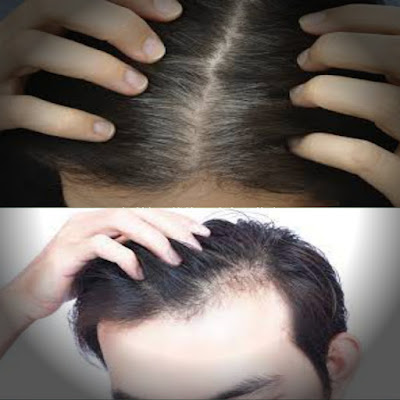The corona virus disease 2019 (COVID-19) outbreak is spreading rapidly across the globe, affecting over 2 million people and causing many deaths worldwide.
Can COVID-19 cause hair loss?
The corona virus disease 2019 (COVID-19) outbreak is spreading
rapidly across the globe, affecting over 2 million people and causing many
deaths worldwide. One of the symptoms associated with COVID-19 infection is
acute respiratory distress syndrome (ARDS), characterized by diffuse alveolar
damage and pulmonary edema, ^,^ leading to severe dyspnea, hypoxemia, and even
death. In addition, some patients may develop severe pneumonia and experience
rapid progression to acute respiratory failure. There have been reports regarding
the risk factors for severe COVID-19. Age is the strongest predictor,
especially in elderly patients. Other epidemiological features include male
sex, obesity, hypertension, diabetes mellitus, chronic obstructive pulmonary
disease, cancer, cardiovascular disease, smoking history, and pregnancy.
However, little information exists about the effect of SARS-CoV-2 on human hair
follicles. Herein, we report a case of a patient who developed a severe
inflammatory reaction after COVID-19 infection, accompanied by alopecia.
Furthermore, certain viruses, such as cytomegalovirus,
Epstein-Barr virus, herpes simplex virus, and varicella zoster virus, have been
linked to hair loss.
It is hypothesized that hair loss occurs secondary to increased
activation of T helper type 17 cells or increased proliferation of
keratinocytes induced by proinflammatory cytokines, which may act via toll-like
receptors (TLRs). Therefore, the use of antiviral therapies could potentially
prevent or reduce the severity of alopecia caused by COVID-19 and its
complications.
This is the first case report describing hair loss in a patient
with COVID-19. Although the exact mechanism underlying these findings is
unknown, two major possible explanations exist. First, the cytokine storm
hypothesis proposes that cytokine release leads to apoptosis of hair follicles
directly, resulting in alopecia. Second, the TLR signaling pathway also plays a
significant role in regulating the differentiation of keratinocytes, thus
leading to hair loss. Both mechanisms support the effectiveness of antiviral
drugs in treating COVID-19-associated alopecia. In this case, prednisone was
effective in alleviating the patient\'s hair loss. Further studies are needed
to confirm whether there is a causal relationship between SARS-CoV2 and hair
loss.
COVID-19 is spreading rapidly around the globe, causing many
people to live under extreme lockdown conditions while their families stay
behind. Most of us have been told to stay home and not leave our homes unless
we absolutely need some fresh air, food, and supplies. However, even if you do
not feel well, you never know whether or not you might be able to infect
others.
In addition to staying inside, you should avoid going out near
public places, especially crowded ones where you could potentially spread the
virus. If you do have to go out, wear masks, always wash your hands, and keep
them clean at all times.
But what about your body? Have you ever considered how the corona virus affects your hair?
You may already be familiar with the fact that being bald is one
of the worst things that can happen to you. There’s no denying that having hair
means having value. But, since you probably don’t want to lose any more than
you already have, you may be wondering how to protect yourself if you get
infected by the COVID-19 virus.
In fact, there are many reasons why you should avoid losing your
hair, including:
• You’ll no longer look “normal.”
• You’re less likely to attract potential partners.
• Yourself confidence may take a hit.
If you start losing your hair due to the effects of COVID, then
your options may seem pretty limited. As it turns out, though, there are
several ways you can help prevent this from happening.
There are a few different types of hair loss, but the two most
common forms of hair loss are male pattern baldness (also known as Androgen tic
Alopecia) and female pattern alopecia (trichotillomania).
Male Pattern Baldness
This type of hair loss occurs due to hormonal changes in men.
It’s caused by the testosterone hormone, which tells your hair follicles to
stop producing hair and starts making them smaller instead. In most cases, this
only happens in men who have normal hair growth cycles, meaning they produce
enough hair before beginning to decline.
Other causes of this kind of hair loss include:
• Medications that can affect hormones









0 Comments